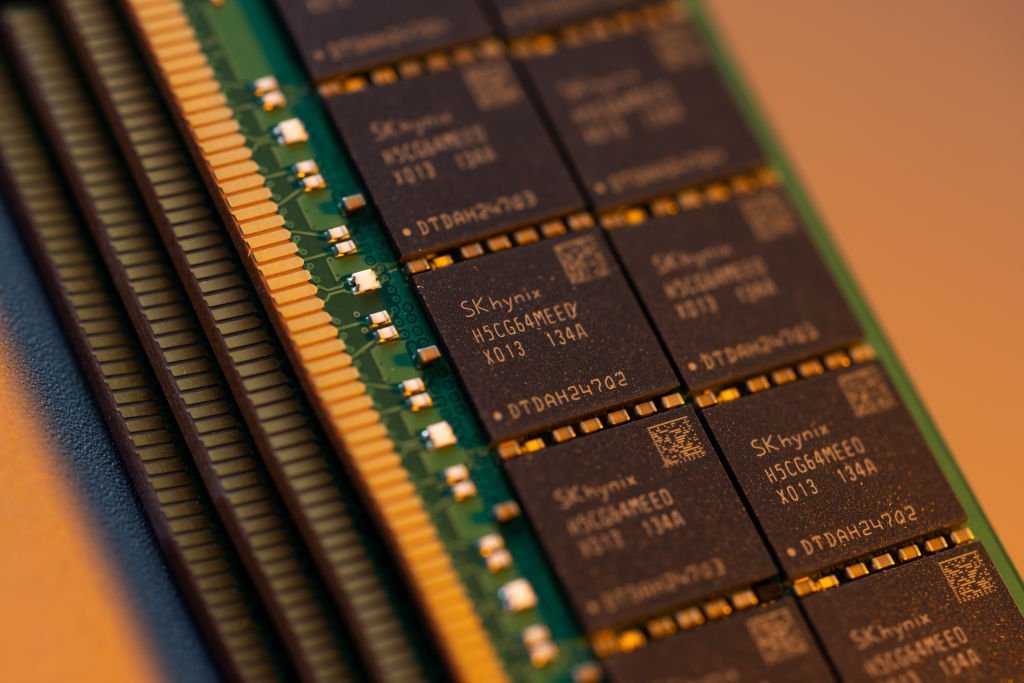
For the CHIPS Act to pay off, the US needs a historic investment in memory production
Reading Time: 3 minutesIn the year since President Biden signed the CHIPS and Science Act, there has been significant attention paid to this landmark legislation to rebuild the U.S’ semiconductor industry. We’ve seen numerous announcements of historic private-sector investments focused on strengthening domestic semiconductor manufacturing, supply chain and R&D. Yet most of the national conversation has focused on logic chips.
There is another category of semiconductors that is at risk of being forgotten: memory chips. Since the invention of the first commercially viable ‘dynamic random-access memory’ (DRAM) in the early 1970s, memory has been one of the key enablers of modern computing systems, helping drive the overall semiconductor industry. Virtually all modern electronics, including cell phones, cars, medical gear, military systems, and cloud data centers, are dependent on large amounts of memory to safely store the information on which we rely. And given the insatiable demands of today’s aptly named ‘data economy,’ this dependence grows stronger every year: Memory is mission-critical to the technologies of the future, such as AI and supercomputing.
Memory technologies are at the heart of enabling and sustaining our nation’s innovation competitive edge, yet less than 2% of the world’s memory supply is manufactured within the U.S., and all of that comes from a single company, Micron Technology. Currently, every leading-edge memory fab is located in Asia, with more being built every year as nations realize the importance of memory. This has formed an overconcentration of manufacturing capacity and supply chain risk that’s significantly more dangerous than that found in the logic industry.
Domestic production of secure memory technology is critical to U.S. technology leadership, jobs and economic growth, as well as our national and economic security, and thus requires immediate attention.
As someone who built a career in memory and serves as an adviser to companies and the government, I can vouch that memory is a brutally competitive business. Last year, memory represented about 28% of the global $556 billion semiconductor market, about the same percentage as logic. However, while often overshadowed by the larger advertising and branding budgets of logic companies, the workhorse memory industry drives a far larger share of the industry’s capital spending.
New memory fabs must be built significantly larger than most logic fabs to be competitive. Keeping up with the most advanced technology drives massive R&D bills, as well as steep ongoing capital reinvestment. And these investments must be made every year, despite profitably that is far lower on average and much more volatile than found in the logic industry.
Unfortunately, U.S. companies aren’t competing on a level playing field. The memory industry owes its start to U.S. innovation, but today is concentrated in Asia where governments have responded to the industry’s economics by subsidizing memory production and R&D.
Securing the supply chain for these essential system ingredients should be reason enough for the U.S. to invest in memory. The integrity of every computing system we rely on is directly dependent on devices that store our critical information. Geopolitical disruption of the memory supply chain would be catastrophic to every segment of the economy, but making an investment in memory has additional tremendous benefits for the U.S.
First, memory drives the lion’s share of the demand for production semiconductor equipment. While the U.S. still leads this industry, the benefit goes to offshore nations intent on monopolizing memory. A U.S. memory investment would help ensure this equipment enables our own production first, in addition to providing the large domestic volume demand for everything from raw materials to silicon wafers to the chemicals and gasses on which semiconductor production relies.
Second, the size and scale of memory fabs would allow the U.S. to truly revitalize the domestic skills base in fab construction and operation, providing a stable base of well-paying jobs that cannot rely on logic fab construction alone for sustainability.
Finally, increased investment in new memory fabs would be large enough to economically transform entire communities and regions. And the stimulus benefits of the core investment are multiplied by the economic activity generated in local communities and along the supply chain.
We are at a critical juncture, and the Biden administration must ensure that some of the largest opportunities created by the CHIPS and Science Act are leveraged on behalf of the memory industry. Semiconductor memory is foundational to our nation’s technical leadership and yet is more at risk than ever. As policymakers debate the merits of different semiconductor projects, the economic and national security benefits of a historic investment in leading-edge memory production are sure to pay off for the U.S. We cannot forget about memory.
Ref: techcrunch
MediaDownloader.net -> Free Online Video Downloader, Download Any Video From YouTube, VK, Vimeo, Twitter, Twitch, Tumblr, Tiktok, Telegram, TED, Streamable, Soundcloud, Snapchat, Share, Rumble, Reddit, PuhuTV, Pinterest, Periscope, Ok.ru, MxTakatak, Mixcloud, Mashable, LinkedIn, Likee, Kwai, Izlesene, Instagram, Imgur, IMDB, Ifunny, Gaana, Flickr, Febspot, Facebook, ESPN, Douyin, Dailymotion, Buzzfeed, BluTV, Blogger, Bitchute, Bilibili, Bandcamp, Akıllı, 9GAG